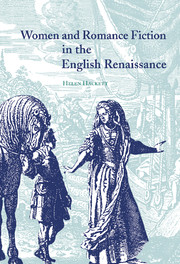Book contents
- Frontmatter
- Contents
- Acknowledgements
- List of abbreviations and a note on the text
- Introduction
- 1 The readership of Renaissance romance
- 2 Renaissance romance and modern romance
- 3 Novellas of the 1560s and 1570s
- 4 Spanish and Portuguese romances
- 5 Fictions addressed to women by Lyly, Rich and Greene
- 6 The ‘Arcadia’: readership and authorship
- 7 The ‘Arcadia’: heroines
- 8 ‘The Faerie Queene’
- 9 Shakespeare's romance sources
- 10 Lady Mary Wroth's ‘Urania’
- Epilogue: The later seventeenth century
- Notes
- Bibliography
- Index
Epilogue: The later seventeenth century
Published online by Cambridge University Press: 01 September 2009
- Frontmatter
- Contents
- Acknowledgements
- List of abbreviations and a note on the text
- Introduction
- 1 The readership of Renaissance romance
- 2 Renaissance romance and modern romance
- 3 Novellas of the 1560s and 1570s
- 4 Spanish and Portuguese romances
- 5 Fictions addressed to women by Lyly, Rich and Greene
- 6 The ‘Arcadia’: readership and authorship
- 7 The ‘Arcadia’: heroines
- 8 ‘The Faerie Queene’
- 9 Shakespeare's romance sources
- 10 Lady Mary Wroth's ‘Urania’
- Epilogue: The later seventeenth century
- Notes
- Bibliography
- Index
Summary
It is hard to know how many readers the Urania had in the seventeenth century. Although Wroth promised the Duke of Buckingham after the Denny scandal that she would attempt to recall copies, there is no evidence of whether this happened. The fact that the work was never reprinted might suggest relative obscurity; but, on the other hand, twenty-nine copies are known to survive today, which is not a bad number; only around twenty surviving copies are known of each of the 1590 and 1593 Arcadias, for instance. We do know of one woman who certainly owned and therefore probably read Wroth's romance: as mentioned before, one copy is three times inscribed ‘Dorothy Long her booke’. Another woman, herself an experimenter with the romance genre, at least knew about the row Wroth's publication caused. Lord Denny had directed Wroth to ‘Work oth[er] Workes leave idle bookes alone / For wise and worthyer women have writte none’. Margaret Cavendish, Duchess of Newcastle, in a preface to her own first publication, Poems, and Fancies (1653), complained that men
hold Books as their Crowne, and the Sword as their Scepter, by which they rule, and governe. And very like they will say to me, as to the Lady that wrote the Romancy,
Work Lady, work, let writing Books alone,
For surely wiser Women nere wrote one.
- Type
- Chapter
- Information
- Women and Romance Fiction in the English Renaissance , pp. 183 - 193Publisher: Cambridge University PressPrint publication year: 2000



